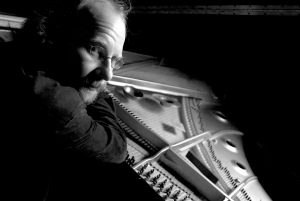(homepage c.brown): www.cbmuse.com

photo @ Lenny Conzalez
Carl Ludwig Hübsch:“Chris, from a point of view as a listener, how do you tell whether an improvisation is good?“
Chris Brown: „I think there’s more than one way probably. The first thing that comes to my mind is that I’m hearing ideas. I’m hearing something that’s developing, an idea that grows in some way. If that is in the solo situation, it’s like that. In a duet situation or a group situation, I’m usually listening to the interaction between the players, which shows me that they are listening and that together they are creating a conversation, but more like a structure by means of their responses to each other – that you can feel and hear the growth of ideas in the music. Maybe that’s the most inclusive definition I can respond with.“
Huebsch: „So, is there something that an improviser needs to know that a person who plays written music doesn’t need to know? Is there a different qualification?“



